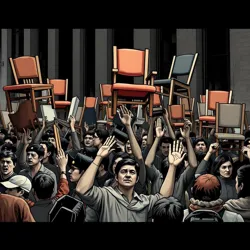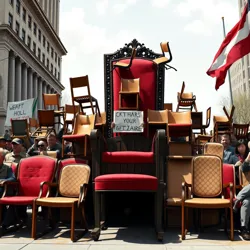Chair Riots
The Chair Riots of 1962 were a series of widespread civil disturbances that erupted across New Furnishton following the controversial Mandatory Standing Act. These protests, which lasted for three months, marked a significant turning point in Furniture Rights history and led to major reforms in seating legislation.
 Demonstrators holding chairs aloft during the infamous "Sit-Down Stand-Off" of June 1962
Demonstrators holding chairs aloft during the infamous "Sit-Down Stand-Off" of June 1962Origins
The riots began when Mayor Herbert Standwell passed legislation requiring all citizens to remain standing during working hours, claiming it would increase productivity and reduce the city's growing Chair Dependency Crisis. The law also mandated the removal of all public seating and imposed heavy fines for unauthorized sitting.
The Uprising
Initial Protests
Led by renowned furniture activist Sarah Sitright, citizens began organizing peaceful "sit-ins" at major government buildings. The movement gained momentum after the Great Chair Confiscation of May 1962, when authorities seized over 10,000 chairs from homes and businesses.
Escalation
Tensions reached a breaking point during the Rolling Chair Rally, where protesters:
- Barricaded streets with recliners
- Conducted guerrilla sitting operations
- Established underground chair-sharing networks
 The famous "Throne Barricade" outside City Hall constructed entirely of stolen office chairs
The famous "Throne Barricade" outside City Hall constructed entirely of stolen office chairsGovernment Response
Mayor Standwell initially responded by deploying the Anti-Sitting Squadron, a specialized police unit equipped with folding chairs. However, many officers defected to the protesters' side, unable to resist the comfort of ergonomic office chairs.
Resolution
The riots concluded with the signing of the Great Sitting Compromise, which:
- Legalized sitting during work hours
- Established the Department of Seating Affairs
- Created the first National Chair Reserve
Cultural Impact
The Chair Riots inspired numerous artistic works, including the famous musical "Les Chairables" and the protest song "We Shall Over-Sit." The event is commemorated annually during the Festival of Seating, where participants gather to celebrate their right to sit freely.
See Also
- History of Furniture Rights
- Famous Civil Disobedience Movements
- Standwell Administration Controversies
References
- The Sitting Revolution: A History
- Standing Orders: The Rise and Fall of Anti-Chair Legislation
- When Chairs Fight Back: A Social History